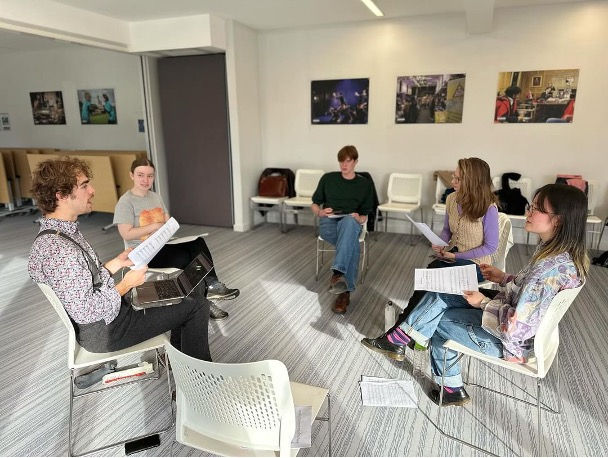An Interview with The Rich Teas *doo wop*
- Ella Byrne-Cabot
- Oct 11, 2024
- 3 min read
The Rich Teas are St Andrews’ freshest acapella group, right out of the biscuit sleeve. They fill a niche that has been lacking in this town’s music scene – namely, doo wop. I sat down in Sallie’s quad to discuss the details with Aidan, the guy behind the group.
I was curious to know what distinguishes “doo wop” from other forms of acapella, so that’s what I asked him first. He answered: “Doo wop was a really popular style of music in the forties and fifties especially in the US. It never really made its way across the pond or across any borders really.
"It stayed in the US, and it started out as acapella. It was mainly African American, but also Hispanic, Italian American, et cetera, communities where teenagers didn't really have any instruments and they just got together after school and sang it together.”
Credit: Struan Barker.
When asked about the process for arranging a doo wop song for the group, Aidan replied, “I guess generally I'm not so much of a rule follower, but there's definitely a doo wop chord progression, for example. It's a very simple chord progression, I–VI–IV–V. I also try to incorporate a lot of nonsense syllables, if I may, in the lyrics. Like for example, “doo wop”, “boom shaboom,” things like that, that I don't think other acapella genres focus on so much.
"But it also has a specific sound, I don't know how to describe it. Like if you hear a doo wop song, like “Crying in the Chapel” or “Sh-Boom” or whatever, you know. Okay, that, feels like doo wop.” These references to the classics made me wonder if there were any specific groups that they were excited to emulate. As far as emulation: “No particular groups.”
As far as inspiration: “I’m definitely inspired by, I guess the OGs, like the Del-Vikings, the Orioles, the Penguins, the Marcels, Chordettes. I think those are all like the big names in doowop.”
I ask further if there’s any specific songs that he’s excited to do with the Rich Teas.
Aidan continues, “in terms of collegiate acapella, we're the first doowop, collegiate doowop group in the UK, I don't know, definitely in Scotland, and like no one sings these songs anymore, and there's so many great ones! So there's not really one particular one that I'm like, oh, I'm more excited to sing this one over others. It's really special and it's not to say that other groups can't do them, 'cause it's a great sound, but I guess we specialize in cultivating that like doo wop energy, y’know?”
After hearing about the plans for the group, I’m desperate to know the nitty-gritty of starting a new acapella group in St Andrews, about which Aidan has a lot of advice for other aca-hopefuls: “If anyone reading this article is looking to start a new acapella group at St Andrews, you can do so, you don't need to be affiliated with the Acapella Society. I wanted us to be associated with the Acapella Society because you’re advertised on more Union socials, part of the winter and spring showcases that are organized by the Acapella Society, and you have more opportunities to get traction.”
“What I did was I proposed the formation of this group at the AGM in March. Then there was a vote, and I think it's like if two thirds of people vote yea, then you’re approved. I think we're provisionally approved now until there's some re-review of whether we should officially be included in the constitution.”
Candidly, Aidan goes on to say, “There's a lot of bureaucracy in terms of the Union and all affiliated societies, just because that's the way it works. Once you have an ‘in’ into acapella, it's easier to start new things. If I wasn't part of the Bells (a mixed gender acapella group in St Andrews) last year, I would definitely not have started my own group this year just because I wouldn't know who the people in acapella are, what the showcases are and what SAC (St Andrews A Cappella Society) is.”
Connections, connections, connections, ain’t that the way?
I ended our talk with an opportunity for self-promotion, to which he replied: “It's definitely a really cool genre and I think that everyone reading should come to our performances when we have them, check our Instagram (@therichteas) and just support acapella generally.”
He says further: “Not only the Rich Teas, but also in St. Andrews and Scotland. I think it's a really fun art form and a really important part of the music scene here. If anyone reading the article wants to collaborate with us, we are definitely open to collaboration.”






Comments